Chancellor Mnookin highlights connected future in central, northern Wisconsin
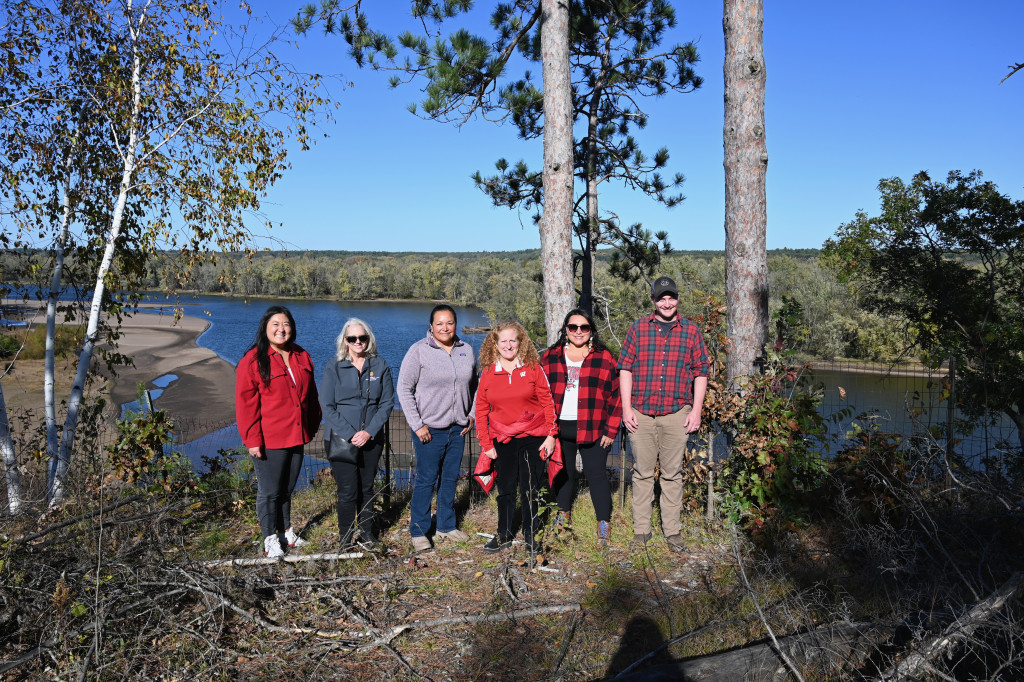
UW–Madison Senior Director of State Relations and Statewide Outreach Crystal Potts, UW–Madison College of Agricultural and Life Sciences Dean Glenda Gillaspy, Ho-Chunk Nation District 1 Representative Jessika Greendeer, Chancellor Jennifer L. Mnookin, UW–Madison Director of Tribal Relations Carla Vigue and Ho-Chunk Nation DNR Executive Director Brandon Bleuer pose for a photo at the Nine Eagles Property on Ho-Chunk Nation land that overlooks the Wisconsin River in Lyndon Station. Photo by Anna Barry/UW–Madison
Badgers have a strong presence in Monroe and Juneau counties in central Wisconsin, and in Oneida and Vilas counties in the Northwoods. Combined, more than 200 current UW–Madison undergraduates, 2,347 alumni and 118 employees reside in just these four counties. Add that to the two research centers and partnerships with dozens of local businesses, health care centers and educational institutions located across the area.
These university partnerships were at the center of UW–Madison Chancellor Jennifer L. Mnookin’s visit to the four counties the week of Oct. 14. It was also a chance to explore new opportunities that enhance the area’s natural resources, build the state’s economy and advance important research.
“There are so many amazing stories, connections and strengths to talk about,” Mnookin said about the university’s relationship to Wisconsinites during her visit to Trout Lake Station near Boulder Junction.
The UW–Madison Center for Limnology operates Trout Lake Station, which is celebrating 100 years supporting environmental and limnological research, training and outreach in Wisconsin’s Northwoods. The station supports year-round research and community engagement, providing public talks and species identification services to residents.
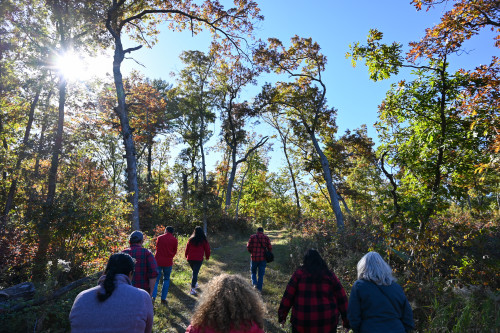
UW–Madison researchers, staff, organizational partners, alumni and community members tour Trout Lake Station near Boulder Junction as part of a visit to Oneida and Vilas counties. Photo by Anna Barry
Gretchen Gerrish, the director of Trout Lake Station, led Mnookin on a tour of the facility along with Karl Martin, dean and director of UW–Madison Division of Extension, and Troy Runge, associate dean for research at the College of Agricultural and Life Sciences.
The topics being researched at the station connect directly with challenges and needs faced by area residents, Gerrish said.
“Water is a unifier. Residents interact with it all the time,” he said.
In addition to a facility tour, Mnookin participated in a round-table discussion with Trout Lake Station researchers and staff and members of partner institutions, including the Wisconsin DNR, Nicolet College and the local UW–Madison alumni chapter.
During the discussion, both Mnookin and Nicolet College President Kate Ferrel noted a recently announced partnership that creates a seamless pathway for Nicolet College students to transfer to UW–Madison Online, showcasing the new opportunity for them to earn a Bachelor of Business Administration degree without leaving the Northwoods.
Following the roundtable, Mnookin traveled to the Kemp Natural Resources Station near Woodruff.
Operated by CALS, Kemp supports research on forest and wildlife ecology, with a strong emphasis on responsible management of local natural resources. Kemp Station’s 231 acres support some of the last remnants of old-growth forest in the Lake States, and scientists from CALS and from numerous out-of-state universities have used Kemp to study fungi, plants, mammals, birds, reptiles, amphibians, fish and insects.
Chancellor Mnookin also traveled to Rhinelander to visit Enterprise Wood Products — a family-owned business led by UW–Madison alum Tom Ory that produces custom wood products from locally sourced timber. The visit drove home the importance of the wood product industry in northern Wisconsin communities and, consequently, the significance of the ongoing research and outreach efforts bolstered by Kemp Natural Resources Station.
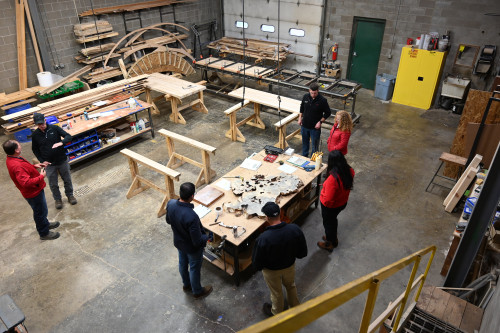
In the wood shop at Enterprise Wood Products in Rhinelander, Wisconsin, Tom Ory and Steve Ory describe refinishing a maple trunk cutting to prepare it to become a table. Photo by Katie McMullen
Enjoying the peak autumn colors, Mnookin visited a renowned Northwoods landmark: the Hodag sculpture in Rhinelander.
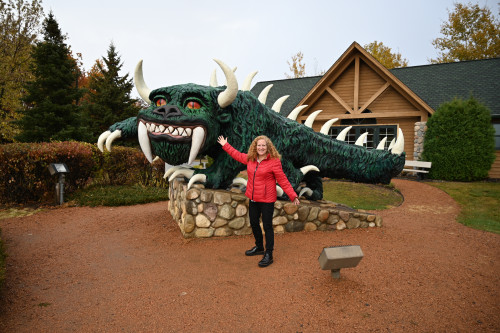
Chancellor Mnookin poses in Rhinelander, Wisconsin in front of a representation of “The Hodag,” a legend that has become the city’s official symbol (and high school mascot).
“What a beautiful part of our great state!” observed Chancellor Mnookin.
In Monroe County, Mnookin visited Russell Rezin & Son Cranberry Marsh, a fifth-generation family farm in Warrens. Rezin & Son has ongoing partnerships with researchers at CALS to improve farming and production. Pest control, frost protection and nutrient management are just a few areas Wisconsin cranberry growers and UW–Madison researchers have worked together to improve.
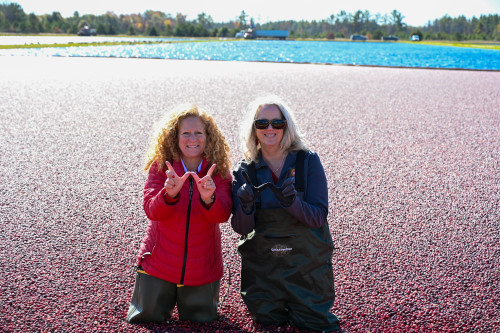
Chancellor Mnookin and CALS Dean Glenda Gillaspy get their feet wet in a cranberry marsh.
State Rep. Nancy VanderMeer and CALS Dean Glenda Gillaspy also joined to discuss potential future collaborations related to agriculture, natural resources management, and economic growth in central Wisconsin.
In Juneau County, Mnookin visited Ho-Chunk Nation land overlooking the Wisconsin River near Lyndon Station. The Ho-Chunk Nation’s DNR is currently doing projects on the Nine Eagles Property that include wildlife data collection and an oak savannah restoration. Representatives of UW–Madison and the Ho-Chunk Nation discussed the ongoing work and potential future research collaborations on the site.
“This is all about a partnership all the way around, not just between our Nation and the university. We’re all just trying to be good citizens and good relatives to one another,” said Ho-Chunk Nation District 1 Legislator Jessika Greendeer, who met with UW–Madison representatives at Nine Eagles.
Greendeer shared her hope that working with organizations such as UW–Madison will lead to faster solutions to important problems.
“A lot of this work is legacy work. It’s not about what we’re going to see; it’s about what the next generations are going to see and experience,” she added.
Gillaspy noted that engaging with Native Nations allows access to their unique expertise. “You can approach some different problems that maybe we weren’t approaching at the university,” she said. “It’s a true partnership, and in any good partnership, both entities should benefit from it.”
“The more we get a sense of what the Ho-Chunk Nation’s priorities are and how we can help support them for education and research and outreach, the better we can work together and the better we can serve the whole state,” Mnookin said. “That’s what our shared future is all about.”
Subscribe to Wisconsin Ideas
Want more stories of the Wisconsin Idea in action? Sign-up for our monthly e-newsletter highlighting how Badgers are taking their education and research beyond the boundaries of the classroom to improve lives.
Tags: chancellor, The Wisconsin Idea




